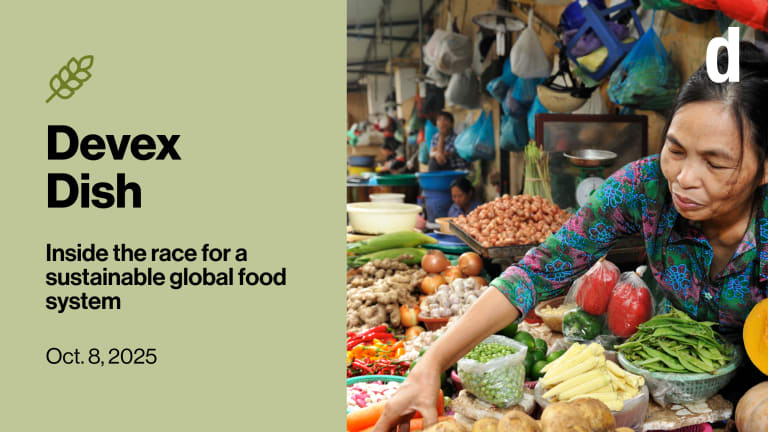
In 2021, the United Nations’ Nutrition for Growth Year of Action has a unique opportunity to address the global impact of malnutrition. The U.N. Food Systems Summit later this month and the Tokyo Nutrition for Growth Summit in December will both be important landmarks in the journey toward healthier, more sustainable, and equitable food systems — creating a just and resilient world where no one is left behind.
Get the inside track on how agriculture, nutrition, sustainability, and more are intersecting to remake the global food system in this weekly newsletter.
No single entity has a silver bullet to solve global malnutrition, but the private sector has a vital role to play. We must hold the world’s biggest companies accountable, and work together to build back better for a global recovery from the COVID-19 pandemic.
Global malnutrition in the post-COVID-19 era is a complex and urgent crisis — one that requires immediate action. The pandemic has shown us the fragility of supply chains, but we’ve also seen some companies using this as an opportunity to innovate. With increasing demand for healthy products from consumers, there is an opportunity for manufacturers to take on this responsibility, to use the new post-COVID-19 reality to enable healthier diets for all.
Companies must be part of the solution, not the problem
Access to Nutrition Initiative’s Global Index 2021 assessed the 25 largest global food and beverage manufacturers and their contributions to addressing malnutrition in all its forms: being overweight, obesity, undernutrition, and micronutrient deficiencies. It scored and ranked those companies based on their nutrition-related commitments and policies, practices, and disclosures across seven categories: governance, products, accessibility, marketing, lifestyles, labeling, and engagement.
It also assessed the healthiness of companies’ product portfolios using the Health Star Rating model and included an assessment of baby food companies’ marketing of breast milk substitutes.
This index demonstrated the absolute importance of companies making healthy food affordable and accessible to all markets, particularly for at-risk consumers from low-income households and those that lack physical access to nutritious food.
Companies must commit to global policies that demonstrate objective, measurable targets to improve the pricing and distribution of healthy products.
—Despite this imperative, little progress has been made in the past three years. Though efforts have been made in some areas — particularly around nutritional governance and labeling, some companies improving the healthiness of their product portfolios, and the average score across the index improving slightly — the rest have stagnated.
Since the last iteration of the ranking, only one of the top ten rated manufacturers actually improved their index score. Far more needs to be done if we are to achieve the Sustainable Development Goals set out by the U.N. — even more than we thought before the onset of COVID-19.
Ensuring access and availability to affordable healthy food is crucial. But only 31% of all products from the companies assessed by the global index met the independent HSR — a standard of 3.5 out of 5 stars or higher. This amounts to just 11,797 of the 38,176 distinct products sold by the 25 companies globally. Only five of those businesses had half or more of their products meet the healthy threshold, while nine companies showed some improvement in this area — showing potential for positive change.
A clear path
There are tangible actions and companies can take to improve and gain a better foothold.
Opinion: Why reinvent the wheel on food security and nutrition?
There are calls for a new science-policy body for food security and nutrition — but a high-level group that does this exact work already exists, write Committee on World Food Security panel experts.
One of the most important findings from the index suggests that real nutritional change comes from company commitments from the top and use a global approach to creating accessible and affordable healthy products — a strategy that should be integrated throughout a company’s policies and in all key markets.
Stand-alone policies and ad-hoc promises are inadequate for improving the accessibility and affordability of healthy food. This is an area that the index identified limited progress in, with company scores lowest in this category. Companies must commit to global policies that demonstrate objective, measurable targets to improve the pricing and distribution of healthy products — especially in low-income markets where populations are at risk or experiencing malnutrition, and set goals to hold them accountable and achieve change.
Companies must do more to develop and deliver a comprehensive strategy that improves the overall nutritional quality of their portfolios. Product innovation, reformulation, diverging from unhealthy product lines, and/or acquiring healthier brand lines will contribute to delivering healthy alternatives to more consumers — and this should be a priority.
International guidance by the World Health Organization and Food and Agriculture Organization recommends that food is fortified with clear health benefits to consumers. Far too few companies, however, follow that guidance. To contribute to healthy eating worldwide, particularly for consumers who need it the most, companies must commit to only fortifying products that are healthy and inherently high-quality to address undernutrition.
Lastly, companies have a responsibility to market their products fairly and clearly to enable consumers’ right to make informed purchases. The last index found that no companies applied interpretive nutrition labeling on the front of products, meaning consumers had no indication of the nutritional quality of what they were purchasing.
By 2021, six companies had introduced the practice to some or all products globally, but those are still less than half. In order for consumers to make informed choices, companies must commit to applying interpretive nutritional labeling to the front of more product ranges — a small but immensely effective change.
Wake-up call
The results of the global index should serve as an urgent wake-up call for the industry, governments, and society. We must work together and bolster our efforts to tackle the world’s toughest nutrition challenges. Action and accountability are the only ways we can ensure that everyone has access to a healthy and affordable diet.
Companies need to prioritize nutrition and make stronger commitments to improve food systems and tackle malnutrition on a global level. Each must honor the responsibility of delivering healthy product offerings to consumers across the globe and not leave nutrition behind. That’s no small task, but it’s one that urgently requires action if we are to deliver on the SDGs, end world hunger, and ensure good health and well-being.
Search for articles
Most Read
- 1
- 2
- 3
- 4
- 5








